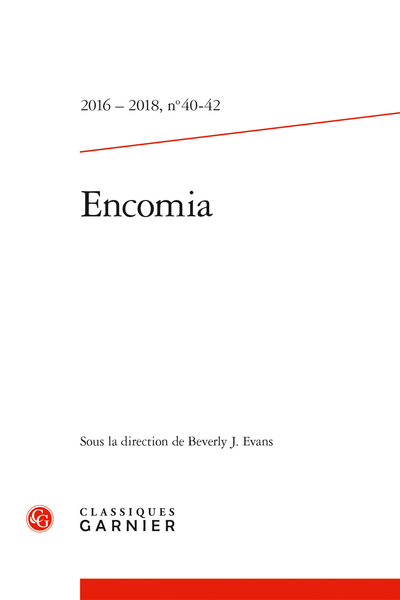
Encomia: a personal farewell
- Type de publication : Article de revue
- Revue : Encomia
2016 – 2018, n° 40-42. Bulletin bibliographique de la Société internationale de littérature courtoise - Pages : 13 à 14
- Revue : Encomia
- Thème CLIL : 4027 -- SCIENCES HUMAINES ET SOCIALES, LETTRES -- Lettres et Sciences du langage -- Lettres -- Etudes littéraires générales et thématiques
- EAN : 9782406109587
- ISBN : 978-2-406-10958-7
- ISSN : 2430-8226
- DOI : 10.15122/isbn.978-2-406-10958-7.p.0013
- Éditeur : Classiques Garnier
- Mise en ligne : 05/10/2020
- Périodicité : Annuelle
- Langue : Anglais
ENCOMIA: A PERSONAL FAREWELL
As Encomia comes to the end of its active life, it is time to say good-bye. From my personal point of view, I do so with a heavy heart, as Encomia played an important part in the earlier years of my academic life. This started in 1974 when I received a postcard from Professor Ray Cormier of Temple University in Philadelphia (how many postcards do academics send each other these days? – this one reached me in Liverpool having been sent to a university residence in Canada that I had left about four years previously). Ray was aware that I shared his interest in early French romances and he was asking me to found a Canadian Branch of the International Courtly Literature Society, which had recently held its first congress at Temple University.1 Once he was aware that I was in the UK and not in Canada, Ray asked me to form a British Branch of this new Society. He suggested that, if I was interested, I should contact Alan Deyermond of Westfield College, London, who had started to gather Hispanic entries for the Society’s bibliographical bulletin. The latter had already been given an intriguing name, Encomia (according to my dictionary ‘a formal expression of praise,’‘eulogy’), which was chosen by Ray Cormier himself.
The sub-title has varied over the years, beginning with “Newsletter of the International Courtly Literature Society.” I duly met with Alan in London2 and we agreed that the best forum for launching a British Branch of the ICLS would be, subject to permission (in case it was thought that we were poaching its members!), the forthcoming congress of the International Arthurian Society, which was to be held at 14the University of Exeter in 1975. Permission was granted, and the idea of a new international society dedicated to courtly literature and its accompanying, and ever expanding, bibliography was well received. Since that time the ICLS has had a thriving British Branch. (There was at first some discussion in both the UK and the US of a possible overlap between courtly and Arthurian material, but to my knowledge there has never been any serious rivalry or difficulty.) Teams of bibliographers for Encomia were successfully recruited in several countries and under the initial general editorship of E. Paige Wisotska (College of Charleston) the volumes started to appear, covering at first the period 1975-1977 and then 1978-1980. Thereafter, Encomia appeared on an annual basis, until the recruitment of editors and bibliographers began to run into difficulty, as many universities in their wisdom decided that bibliographical work lacked the importance that was accorded to most other types of research. With the appearance of the present volume, which covers the years 2016-2018, Encomia has now served scholars for nearly forty-five years, during which period, as its name implies, it has provided an irreplaceable homage to medieval courtly literature and society. For my part, I am grateful to all those who have contributed over the years to what soon became and has remained a vital scholarly tool.3
Glyn Burgess
University of Liverpool
1 The Society was founded on the occasion of a special seminar on medieval courtly literature organized by Ray Cormier and held at the Modern Language Association convention in Chicago in 1973.
2 This meeting also gave my career a new direction, as it was on that occasion that Alan asked me to compile a bibliography on Marie de France for the Grant and Cutler Research Bibliographies and Checklists series, which he edited.
3 I am grateful to Ray Cormier for his assistance with this note.